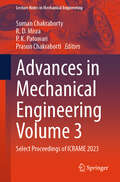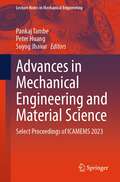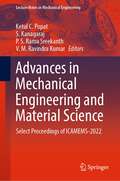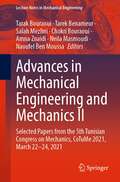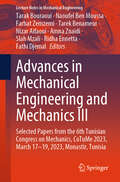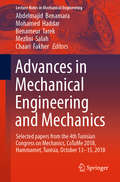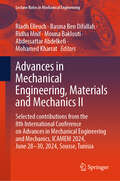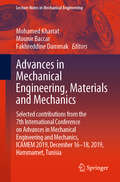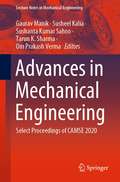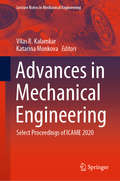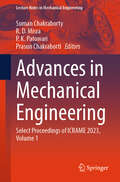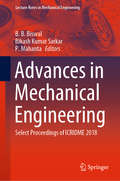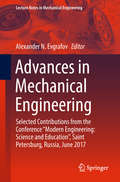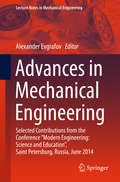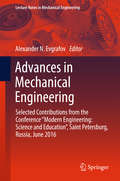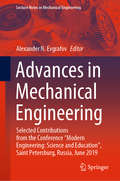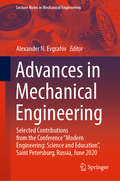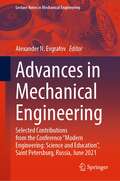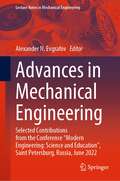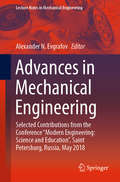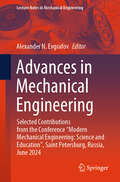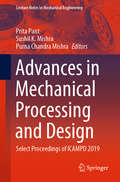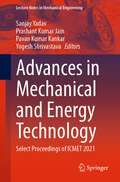- Table View
- List View
Advances in Mechanical Engineering Volume 3: Select Proceedings of ICRAME 2023 (Lecture Notes in Mechanical Engineering)
by Suman Chakraborty R. D. Misra P. K. Patowari Prasun ChakrabortiThis book presents select proceedings of the 4th International Conference on Recent Advancements in Mechanical Engineering (ICRAME 2023). Various topics covered in this book volume are intelligent manufacturing systems, tribology, nanomechanics, MEMS, solar thermal energy, design engineering, materials, conventional and non-conventional machining, etc. The book is useful for researchers and professionals working in the different areas if mechanical engineering.
Advances in Mechanical Engineering and Material Science: Select Proceedings of ICAMEMS 2023 (Lecture Notes in Mechanical Engineering)
by Pankaj Tambe Peter Huang Suyog JhavarThis book presents the select proceedings of the Second International Conference on Advances in Mechanical Engineering and Material Science (ICAMEMS 2023). It covers the latest research in broad areas of manufacturing and materials engineering. Various topics covered in this book are advanced manufacturing processes, additive manufacturing, green manufacturing, industry 4.0, conventional machining processes, non-conventional machining processes, micro machining, materials processing surface science and engineering, advanced composite materials, materials characterization, and many more. The book is useful for researchers and students in the various fields of mechanical engineering.
Advances in Mechanical Engineering and Material Science: Select Proceedings of ICAMEMS-2022 (Lecture Notes in Mechanical Engineering)
by Ketul C. Popat S. Kanagaraj P. S. Rama Sreekanth V. M. Ravindra KumarThis book presents select proceedings of the 1st International Conference on Advances in Mechanical Engineering and Material Science (ICAMEMS 2022). It discusses about the diverse technological advancements, innovations, and achievements in the areas of mechanical engineering and material science. It also covers the developments and challenges in the field of machine design, manufacturing, thermal and fluid engineering. Important topics covered in the conference include advanced manufacturing processes, machining, product design and development, mechatronics and robotics, non-conventional energy resources, green energy and energy harvesting, tribology, materials and characterization. The book also discusses advanced research areas in material science such as smart materials, bio-materials and advanced energy materials. Given the contents, the book will be a valuable reference for students, researchers and industrialists interested in advanced research areas of mechanical engineering and material science.
Advances in Mechanical Engineering and Mechanics II: Selected Papers from the 5th Tunisian Congress on Mechanics, CoTuMe 2021, March 22–24, 2021 (Lecture Notes in Mechanical Engineering)
by Tarak Bouraoui Tarek Benameur Salah Mezlini Chokri Bouraoui Amna Znaidi Neila Masmoudi Naoufel Ben MoussaThis book reports on recent findings and applications relating to structure modeling and computation, design methodology, advanced manufacturing, mechanical behavior of materials, fluid mechanics, energy, and heat transfer. Further, it highlights cutting-edge issues in biomechanics and mechanobiology, and describes simulation and intelligent techniques applied to the control of industrial processes. Chapters are based on a selection of original peer-reviewed papers presented at the 5th International Tunisian Congress on Mechanics, COTUME, which was held on March 22–24, 2021, from Hammamet, Tunisia, in hybrid format. All in all, the book offers a good balance of fundamental research and industrially relevant applications, and an in-depth analysis of the current state of the art and challenges in various subfields of mechanical engineering; it provides researchers and professionals with a timely snapshot and a source of inspiration for future research and collaborations.
Advances in Mechanical Engineering and Mechanics III: Selected Papers from the 6th Tunisian Congress on Mechanics, CoTuMe 2023, March 17–19, 2023, Monastir, Tunisia (Lecture Notes in Mechanical Engineering)
by Nizar Aifaoui Tarak Bouraoui Tarek Benameur Amna Znaidi Naoufel Ben Moussa Fathi Djemal Farhat Zemzemi Slah Mzali Ridha EnnettaThis book offers a selection of original peer-reviewed papers presented at the Sixth International Tunisian Congress on Mechanics, COTUME 2023, held on March 17-19, 2023, in Monastir, Tunisia. It covers advances in engineering design, structure modelling and materials engineering. It also discusses cutting-edge topics in structural dynamics and vibration, fluid mechanics and sustainable energy production. With a good balance of fundamentals and industrial applications, this book offers a useful reference for graduate students, researchers, and professionals in the field of mechanical, industrial, production, manufacturing, and materials engineering. Organized by the Tunisian Association of Mechanics (ATM), COTUME 2023 was also honored by the active participation of the French Association of Mechanics (AFM), the Moroccan Society for Mechanical Science (SMSM) and the Algerian Association for Technology Transfer (A2T2).
Advances in Mechanical Engineering and Mechanics: Selected Papers from the 4th Tunisian Congress on Mechanics, CoTuMe 2018, Hammamet, Tunisia, October 13–15, 2018 (Lecture Notes in Mechanical Engineering)
by Mohamed Haddar Abdelmejid Benamara Benameur Tarek Mezlini Salah Chaari FakherThis book reports on original theoretical and experimental findings related to a number of cutting-edge topics in mechanics and mechanical engineering, such as structure modelling and computation; design methodology and manufacturing processes; mechanical behaviour of materials; fluid mechanics and energy; and heat and mass transfer. It includes a selection of papers presented at the 4th Tunisian Congress on Mechanics, CoTuMe’2018, held in Hammamet, Tunisia, on October 13–15, 2018. Thanks to the good balance of theory and practical findings, it offers a timely snapshot for researchers and industrial communities alike, and a platform to facilitate communication and collaboration between the two groups.
Advances in Mechanical Engineering and Technology: Proceedings of 6th International Conference on Advanced Production and Industrial Engineering (ICAPIE) - 2021 (Lecture Notes in Mechanical Engineering)
by Pavan Kumar Kankar Ranganath M. Singari Girija MoonaThis book presents the select proceedings of the International Conference on Advanced Production and Industrial Engineering (ICAPIE) - 2021 held at Delhi Technological University, Delhi, during June 18–19, 2021. The book covers the recent advances and challenges in the area of production and industrial engineering. Various topics covered include artificial intelligence and expert systems, CAD/CAM Integration Technology, CAD/CAM, automation and robotics, computer-aided geometric design and simulation, construction machinery and equipment, design tools, cutting tool material and coatings, dynamic mechanical analysis, optimization and control, energy machinery and equipment, flexible manufacturing technology and system, fluid dynamics, bio-fuels, fuel cells, high-speed/precision machining, laser processing technology, logistics and supply chain management, machinability of materials, composite materials, material engineering, mechanical dynamics and its applications, mechanical power engineering, mechanical transmission theory and applications, non-traditional machining processes, operations management, precision manufacturing and measurement, precision manufacturing and measurement, reverse engineering and structural strength and robustness. This book is useful for various researcher mainly mechanical and allied engineering discipline.
Advances in Mechanical Engineering, Materials and Mechanics II: Selected contributions from the 8th International Conference on Advances in Mechanical Engineering and Mechanics, ICAMEM 2024, June 28-30, 2024, Sousse, Tunisia (Lecture Notes in Mechanical Engineering)
by Mohamed Kharrat Riadh Elleuch Basma Ben Difallah Ridha Mnif Mouna Baklouti Abdessattar AbdelkefiThis book reports on cutting-edge research in the broad fields of mechanical engineering and mechanics. It describes innovative applications and research findings in design and manufacturing, applied and fluid mechanics, dynamics and control, thermal science, and materials. It also highlights several relevant advances in industrial applications. All papers were carefully selected from contributions presented at the International Conference on Advances in Mechanical Engineering and Mechanics, ICAMEM 2024, held on June 28-30, 2024, in Sousse, Tunisia, and organized by the Laboratory of Electromechanical Systems (LASEM) at the National School of Engineers of Sfax (ENIS) and the Tunisian Scientific Society (TSS), in collaboration with a great number of national and international research institutions and laboratories.
Advances in Mechanical Engineering, Materials and Mechanics: Selected contributions from the 7th International Conference on Advances in Mechanical Engineering and Mechanics, ICAMEM 2019, December 16-18, 2019, Hammamet, Tunisia (Lecture Notes in Mechanical Engineering)
by Mohamed Kharrat Mounir Baccar Fakhreddine DammakThis book reports on cutting-edge research in the broad fields of mechanical engineering and mechanics. It describes innovative applications and research findings in applied and fluid mechanics, design and manufacturing, thermal science and materials. A number of industrially relevant recent advances are also highlighted. All papers were carefully selected from contributions presented at the International Conference on Advances in Mechanical Engineering and Mechanics, ICAMEM2019, held on December 16–18, 2019, in Hammamet, Tunisia, and organized by the Laboratory of Electromechanical Systems (LASEM) at the National School of Engineers of Sfax (ENIS) and the Tunisian Scientific Society (TSS), in collaboration with a number of higher education and research institutions in and outside Tunisia.
Advances in Mechanical Engineering: Select Proceedings of CAMSE 2020 (Lecture Notes in Mechanical Engineering)
by Susheel Kalia Tarun K. Sharma Om Prakash Verma Gaurav Manik Sushanta Kumar SahooThis book presents the select proceedings of Congress on Advances in Materials Science and Engineering (CAMSE 2020). It focuses on the state-of-the-art research, development, and commercial prospective of recent advances in mechanical engineering. The book covers various synthesis and fabrication routes of functional and smart materials for applications in mechanical engineering, manufacturing, physics, chemical and biological sciences, metrology, optimization and artificial intelligence among others. This book will be a useful resource for researchers, academicians as well as professionals interested in the highly interdisciplinary field of materials science and mechanical engineering.
Advances in Mechanical Engineering: Select Proceedings of ICAME 2020 (Lecture Notes in Mechanical Engineering)
by Vilas R. Kalamkar Katarina MonkovaThis book presents select peer-reviewed proceedings of the International Conference on Advances in Mechanical Engineering (ICAME 2020). The contents cover latest research in several areas such as advanced energy sources, automation, mechatronics and robotics, automobiles, biomedical engineering, CAD/CAM, CFD, advanced engineering materials, mechanical design, heat and mass transfer, manufacturing and production processes, tribology and wear, surface engineering, ergonomics and human factors, artificial intelligence, and supply chain management. The book brings together advancements happening in the different domains of mechanical engineering, and hence, this will be useful for students and researchers working in mechanical engineering.
Advances in Mechanical Engineering: Select Proceedings of ICRAME 2023, Volume 1 (Lecture Notes in Mechanical Engineering)
by Suman Chakraborty R. D. Misra P. K. Patowari Prasun ChakrabortiThis book presents select proceedings of the 4th International Conference on Recent Advancements in Mechanical Engineering (ICRAME 2023). Various topics covered in this book volume are intelligent manufacturing systems, tribology, nanomechanics, MEMS, solar thermal energy, design engineering, materials, conventional and non-conventional machining, etc. The book is useful for researchers and professionals working in the different areas if mechanical engineering.
Advances in Mechanical Engineering: Select Proceedings of ICRIDME 2018 (Lecture Notes in Mechanical Engineering)
by B. B. Biswal Bikash Kumar Sarkar P. MahantaThis book comprises select proceedings of the International Conference on Recent Innovations and Developments in Mechanical Engineering (IC-RIDME 2018). The book contains peer reviewed articles covering thematic areas such as fluid mechanics, renewable energy, materials and manufacturing, thermal engineering, vibration and acoustics, experimental aerodynamics, turbo machinery, and robotics and mechatronics. Algorithms and methodologies of real-time problems are described in this book. The contents of this book will be useful for both academics and industry professionals.
Advances in Mechanical Engineering: Selected Contributions From The Conference Modern Engineering: Science And Education , Saint Petersburg, Russia, June 2016 (Lecture Notes In Mechanical Engineering)
by Alexander N. EvgrafovThis book draws together the most interesting recent results to emerge in mechanical engineering in Russia, providing a fascinating overview of the state of the art in the field in that country which will be of interest to a wide readership. A broad range of topics and issues in modern engineering are discussed, including dynamics of machines, materials engineering, structural strength and tribological behavior, transport technologies, machinery quality and innovations. The book comprises selected papers presented at the 6th conference "Modern Engineering: Science and Education", held at the Saint Petersburg State Polytechnic University in June 2017 with the support of the Russian Engineering Union. The authors are experts in various fields of engineering, and all of the papers have been carefully reviewed. The book will be of interest to mechanical engineers, lecturers in engineering disciplines and engineering graduates.
Advances in Mechanical Engineering: Selected Contributions from the Conference “Modern Engineering: Science and Education”, Saint Petersburg, Russia, June 2014 (Lecture Notes in Mechanical Engineering)
by Alexander EvgrafovThis book draws together the most interesting recent results to emerge in mechanical engineering in Russia, providing a fascinating overview of the state of the art in the field in that country which will be of interest to a wide readership. A broad range of topics and issues in modern engineering are discussed, including dynamics of machines, materials engineering, structural strength and tribological behavior, transport technologies, machinery quality and innovations. The book comprises selected papers presented at the conference "Modern Engineering: Science and Education", held at the Saint Petersburg State Polytechnic University in 2013 with the support of the Russian Engineering Union. The authors are experts in various fields of engineering, and all of the papers have been carefully reviewed. The book will be of interest to mechanical engineers, lecturers in engineering disciplines and engineering graduates.
Advances in Mechanical Engineering: Selected Contributions from the Conference “Modern Engineering: Science and Education”, Saint Petersburg, Russia, June 2016 (Lecture Notes in Mechanical Engineering)
by Alexander N. EvgrafovThis book draws together the most interesting recent results to emerge in mechanical engineering in Russia, providing a fascinating overview of the state of the art in the field in that country which will be of interest to a wide readership. A broad range of topics and issues in modern engineering are discussed, including dynamics of machines, materials engineering, structural strength and tribological behavior, transport technologies, machinery quality and innovations. The book comprises selected papers presented at the conference "Modern Engineering: Science and Education", held at the Saint Petersburg State Polytechnic University in 2016 with the support of the Russian Engineering Union. The authors are experts in various fields of engineering, and all of the papers have been carefully reviewed. The book will be of interest to mechanical engineers, lecturers in engineering disciplines and engineering graduates.
Advances in Mechanical Engineering: Selected Contributions from the Conference “Modern Engineering: Science and Education”, Saint Petersburg, Russia, June 2019 (Lecture Notes in Mechanical Engineering)
by Alexander N. EvgrafovThis book draws together the most interesting recent results to emerge in mechanical engineering in Russia, providing a fascinating overview of the state of the art in the field in that country which will be of interest to a wide readership. A broad range of topics and issues in modern engineering are discussed, including dynamics of machines, materials engineering, structural strength and tribological behavior, transport technologies, machinery quality and innovations. The book comprises selected papers presented at the 8th conference "Modern Engineering: Science and Education", held at the Saint Petersburg State Polytechnic University in May 2019 with the support of the Russian Engineering Union. The authors are experts in various fields of engineering, and all of the papers have been carefully reviewed. The book will be of interest to mechanical engineers, lecturers in engineering disciplines and engineering graduates.
Advances in Mechanical Engineering: Selected Contributions from the Conference “Modern Engineering: Science and Education”, Saint Petersburg, Russia, June 2020 (Lecture Notes in Mechanical Engineering)
by Alexander N. EvgrafovThis book draws together the most interesting recent results to emerge in mechanical engineering in Russia, providing a fascinating overview of the state of the art in the field in that country which will be of interest to a wide readership. A broad range of topics and issues in modern engineering are discussed, including dynamics of machines, materials engineering, structural strength, transport technologies, machinery quality and innovations. The book comprises selected papers presented at the 9th conference "Modern Engineering: Science and Education", held at the Peter the Great Saint Petersburg Polytechnic University in June 2020 with the support of the Russian Engineering Union. The authors are experts in various fields of engineering, and all of the papers have been carefully reviewed. The book will be of interest to mechanical engineers, lecturers in engineering disciplines and engineering graduates.
Advances in Mechanical Engineering: Selected Contributions from the Conference “Modern Engineering: Science and Education”, Saint Petersburg, Russia, June 2021 (Lecture Notes in Mechanical Engineering)
by Alexander N. EvgrafovThis book draws together the most interesting recent results to emerge in mechanical engineering in Russia, providing a fascinating overview of the state of the art in the field in that country which will be of interest to a wide readership. A broad range of topics and issues in modern engineering is discussed, including dynamics of machines, materials engineering, structural strength and tribological behavior, transport technologies, machinery quality and innovations. The book comprises selected papers presented at the 10th conference "Modern Engineering: Science and Education", held at the Saint Petersburg State Polytechnic University in June 2021 with the support of the Russian Engineering Union. The authors are experts in various fields of engineering, and all of the papers have been carefully reviewed. The book will be of interest to mechanical engineers, lecturers in engineering disciplines and engineering graduates.
Advances in Mechanical Engineering: Selected Contributions from the Conference “Modern Engineering: Science and Education”, Saint Petersburg, Russia, June 2022 (Lecture Notes in Mechanical Engineering)
by Alexander N. EvgrafovThis book draws together the most interesting recent results to emerge in mechanical engineering in Russia, providing a fascinating overview of the state of the art in the field in that country which will be of interest to a wide readership. A broad range of topics and issues in modern engineering is discussed, including dynamics of machines, materials engineering, structural strength and tribological behavior, transport technologies, machinery quality and innovations. The book comprises selected papers presented at the 11th conference “Modern Engineering: Science and Education”, held at the Saint Petersburg State Polytechnic University in June 2022 with the support of the Russian Engineering Union. The authors are experts in various fields of engineering, and all of the papers have been carefully reviewed. The book is of interest to mechanical engineers, lecturers in engineering disciplines and engineering graduates.
Advances in Mechanical Engineering: Selected Contributions from the Conference “Modern Engineering: Science and Education”, Saint Petersburg, Russia, May 2018 (Lecture Notes in Mechanical Engineering)
by Alexander N. EvgrafovThis book draws together the most interesting recent results to emerge in mechanical engineering in Russia, providing a fascinating overview of the state of the art in the field in that country which will be of interest to a wide readership. A broad range of topics and issues in modern engineering are discussed, including dynamics of machines, materials engineering, structural strength and tribological behavior, transport technologies, machinery quality and innovations. The book comprises selected papers presented at the 7th conference "Modern Engineering: Science and Education", held at the Saint Petersburg State Polytechnic University in May 2018 with the support of the Russian Engineering Union. The authors are experts in various fields of engineering, and all of the papers have been carefully reviewed. The book will be of interest to mechanical engineers, lecturers in engineering disciplines and engineering graduates.
Advances in Mechanical Engineering: Selected Contributions from the Conference “Modern Mechanical Engineering: Science and Education”, Saint Petersburg, Russia, June 2023 (Lecture Notes in Mechanical Engineering)
by Alexander N. EvgrafovThis book draws together the most interesting recent results to emerge in mechanical engineering in Russia, providing a fascinating overview of the state of the art in the field in that country which will be of interest to a wide readership. A broad range of topics and issues in modern engineering is discussed, including dynamics of machines, materials engineering, structural strength and tribological behavior, transport technologies, machinery quality and innovations, robotics and aircraft dynamics. The book comprises selected papers presented at the 12th conference “Modern Mechanical Engineering: Science and Education”, held at the Saint Petersburg State Polytechnic University in June 2023 with the support of the Russian Engineering Union. The authors are experts in various fields of engineering, and all of the papers have been carefully reviewed. The book is of interest to mechanical engineers, lecturers in engineering disciplines and engineering graduates.
Advances in Mechanical Engineering: Selected Contributions from the Conference “Modern Mechanical Engineering: Science and Education”, Saint Petersburg, Russia, June 2024 (Lecture Notes in Mechanical Engineering)
by Alexander N. EvgrafovThis book draws together the most interesting recent results to emerge in mechanical engineering in Russia, providing a fascinating overview of the state of the art in the field in that country which will be of interest to a wide readership. A broad range of topics and issues in modern engineering is discussed, including dynamics of machines, materials engineering, structural strength and tribological behavior, transport technologies, machinery quality and innovations, robotics and aircraft dynamics. The book comprises selected papers presented at the 13th conference “Modern Mechanical Engineering: Science and Education”, held at the Saint Petersburg State Polytechnic University in June 2024 with the support of the Russian Engineering Union. The authors are experts in various fields of engineering, and all of the papers have been carefully reviewed. The book is of interest to mechanical engineers, lecturers in engineering disciplines and engineering graduates.
Advances in Mechanical Processing and Design: Select Proceedings of ICAMPD 2019 (Lecture Notes in Mechanical Engineering)
by Purna Chandra Mishra Prita Pant Sushil K. MishraThis book presents selected proceedings of the International Conference on Advances in Mechanical Processing and Design (ICAMPD 2019). The contents highlight latest research in next-generation mechanical systems design, thermal and fluid systems design, materials and smart manufacturing processes, and industrial engineering. Some of the topics covered include smart materials, materials processing and applications, smart machinery and machine design, system dynamics and simulation, biomimetics, energy systems, micro- and nano-scale transport, automotive engineering, advance material characterization and testing, and green and sustainable manufacturing. Given the scope of the contents, this book can be of interest to students, researchers as well as industry professionals.
Advances in Mechanical and Energy Technology: Select Proceedings of ICMET 2021 (Lecture Notes in Mechanical Engineering)
by Sanjay Yadav Pavan Kumar Kankar Prashant Kumar Jain Yogesh ShrivastavaThis book presents the select proceedings the 2nd International Conference on Mechanical and Energy Technologies (ICMET 2021). The broad range of topics and issues covered are bulk deformation processes and sheet metal forming, composites, ceramics, and polymers processing, corrosion, heat treatment, microstructure and materials properties, energy materials, failure and fracture mechanics, friction, wear, tribology, and surface engineering, functionally graded materials, cellular materials, low friction and corrosion resistive materials for energy applications, lubricants and lubrication, machinability and formability of materials, material science and engineering, and materials for energy storage. This book will be useful for students, researchers, and professionals working in the areas of mechanical and industrial engineering, energy technologies, and allied fields.
